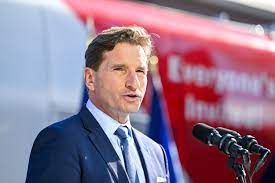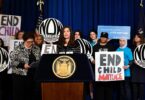Arick Wierson
One of the biggest head-scratchers in national politics as of late is the insurgent candidacy of Minnesota Rep. Dean Phillips for the Democratic presidential nomination, an idea he had been publicly toying with for several months. Phillips formally joined the race by filing paperwork for “Dean 24, Inc.” with the Federal Election Commission Thursday night and on Friday he registered for the New Hampshire Democratic primary, a contest in which President Joe Biden will not appear on the ballot.
New Hampshire has defiantly resisted losing its “first-in-the-nation” primary status amid a shakeup in which the Democratic National Committee reordered the presidential nominating calendar last year. The move has not only kept Biden off the ballot in New Hampshire, but also created an opening for Phillips to pick up an early primary victory. And despite the surfeit of disparaging headline descriptors that characterize Phillip’s bid as “long-shot,” “moon shot” or “the end of his political career,” there may be more to Phillips’ strategy than initially meets the eye.
Over the years, I have gotten to know Phillips fairly well. Not only do I reside in his congressional district – in fact we lived in the same neighborhood just west of the Twin Cities for several years – but I even chronicled some of the more folksy and refreshing aspects of his initial congressional campaign in 2018 for The Observer, in particular his use of a symbolic 1960 International Harvester “Government Repair Truck” as an effective campaign prop. And although Phillips is a relatively new face for most Americans, his backstory certainly seems made for Hollywood, and, as Friday’s announcement suggests, perhaps the national political stage as well. Phillips never met his biological father, Artie Pfefer, an army helicopter pilot who died fighting in Vietnam when Phillips was only six months old. Despite the early tragedy in the young boy’s life, his luck changed dramatically when, only a few years later, his mother Deedee married Edward “Eddie” Phillips, the owner of one of America’s oldest distilleries, the Phillips Distilling Company. Eddie adopted and raised Dean, and gave him the last name he carries to this day.
As a boy, the young scion studied at the prestigious Blake School (whose alumni include fellow Minnesota politicians, former US Sens. Al Franken and Mark Dayton), followed by an undergraduate degree at Brown University and an MBA at the University of Minnesota. But instead of entering into politics straight away, Phillips spent most of his career working in the family business and, later, building and growing a gelato brand known as Talenti. He then sold the company to packaged goods brand Unilever in 2014. With his family wealth and the success from the Talenti exit, Phillips is now worth close to an estimated $80 million, according to Fortune. Yet it was only after achieving all this success in the business world that, in 2018, he decided to jump into the political fray. Sensing an opening in Minnesota’s purplish and suburban third congressional district, which has been in moderate Republican hands for around 60 years, Phillips took the leap.
Given how many voters in the district had been turned off by the first two years of Donald Trump’s presidency, Phillips sensed it was a vulnerable seat. It was a big bet for someone with no prior political experience, but it paid off. And it’s maybe some of that same thinking about political risk-taking which prompted Phillips’ move to challenge Biden as well. Still, like many people inside the beltway and around the country today, I, too, have been struggling to understand the rationale behind Phillips’ move to challenge his own party’s incumbent president. What does a middle-aged congressman, just midway through his third term and with no real landmark legislative victories to point to hope to accomplish by challenging an already uncertain road ahead by Biden – especially with the prospect that whoever wins the primary will have to face off against Trump, a candidate who represents a real existential threat to democracy and the rule of law?
Seeking an answer, I first turned to veteran Democratic consultant James Carville to see what he made of the Minnesota congressman’s nascent presidential run. “I think Dean Phillips is well-intentioned, and I think the party deserves a chance at considering other options,” Carville told me. “And for all those who feel that somehow this run from a challenger might put a chink in Biden’s armor, weakening him before he heads into battle with Trump – that’s total nonsense.” “The real test will be the New Hampshire primary – how well Phillips performs and how much effort the Biden campaign actually puts into a possible write-in campaign will matter. But all this will certainly shift a lot more attention to the Democrats.” Phillips, it would seem, is making a calculation that, despite the heartburn his candidacy is causing among fellow Democrats, the opening in New Hampshire is a “can’t miss” opportunity.
Outgunned financially (Biden is sitting on a $91 million campaign war chest while Phillips is being forced to seed his own campaign effort with a $2 million loan from his personal fortune) and with almost zero national name recognition, winning an uncontested early primary might be the boost he needs to become a much larger figure in the national conversation. It’s hard to argue that Biden would have ended up picking Kamala Harris and Pete Buttigieg for vice president and transportation secretary had they not launched their own “long-shot” presidential runs back in 2019.
Not that Phillips is necessarily eyeing a cabinet-level position in a second Biden term. He is still on the ballot for his congressional seat in his home district in Minnesota, although he will likely face a formidable primary challenger. More likely, Phillips is looking to use the opening in New Hampshire to get his name in play for a 2028 presidential run, when Biden will either be at the end of his term-limits or too old to run again. Moreover, by sliding into the challenger role, Phillips has adroitly positioned himself as a potentially viable alternative should Biden’s health – always a question given his age – deteriorate at some point between now and the Democratic National Convention.
But no matter what the endgame of Phillips’ strategy may be, it will require mending some fences along the way. Phillips’ announcement has seemingly singlehandedly irked the entirety of the Democratic Party firmament. Even his home state governor, Democrat Tim Walz, who up until now has been a strong ally of Phillips, seems a bit peeved, telling the Minneapolis Star Tribune that “[Phillips] is not going to be the nominee…we’re going to have our nominee in President Biden, and that will get done and we’ll move on.” But Phillips does not appear to be dissuaded. Although he is the grandson of the renowned advice columnist Pauline Phillips, also known as “Dear Abby,” for now he is not taking advice from any of his fellow Democrats. Only time will tell if he is making the right move or if he is writing his own political obituary as some in the media have presaged.
CNN







